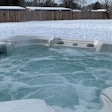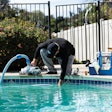
GREEN ISN'T JUST A COLOR anymore. Green means products and services that are sustainable and safe for the environment and people. In the last few years, consumers have become more aware of the importance of green products, green buildings and even green investments. It's increasingly common for consumers to demand green products and services. New companies are springing up and existing companies are branching out to service this trend. Big Business is learning that consumers are increasingly willing to pay for green.
Generally speaking, "going green" denotes a greater awareness of and response toward aspects of an industry that might be environmentally harmful. But perhaps a better word than green is "sustainable." That term was first coined in the 1980s by Gro Harlem Brundtland, past Norwegian prime minister and president of the United Nations World Commission on Environment and Development, when she stated, "It means humanity must ensure that meeting present needs does not compromise the ability of future generations to meet their needs."
What about the pool and hot tub industry. Is there opportunity for the hot tub community to become more sustainable and better stewards of resources. Let's take a look at the state of the industry in terms of that hot new color, green.
Focus On Chemicals
The word "chemical" has a somewhat unsavory connotation these days. But the fact is, a chemical can be as benign as table salt or baking soda, and chemicals are part of the environment. Used responsibly — and in the correct amounts — chemicals don't cause harm.
To keep hot tub water safe, sanitized and balanced, an assortment of chemicals is necessary. We know the list: sanitizers, compounds to adjust pH and other products including cartridge cleaners, stabilizers and balancers. Working with these chemicals is important and requires a regular regimen of care. Otherwise, there can be problems.
It's these problems that have contributed to a growing list of complaints about chemicals over the years. In improper amounts or mixes, chemicals can cause skin irritation or be corrosive to equipment. Plus, chemicals stay in the water when hot tubs are drained, meaning potential impact on the environment.
Revamping spa chemicals and reducing their use is a logical focus, then, as we analyze the shades of green in the industry. But the first place to start is with education and perception. Consumers who know how to properly maintain their hot tubs know that "chemicals" are not as scary as they may seem.
Educating Consumers
Advantis Technologies knows the words "chemicals" and "green" seem at odds in consumers' minds, but contends it shouldn't necessarily be so.
"Chlorine and bromine are naturally occurring elements," says Michael Moore, vice president of marketing for Advantis Technologies. “I think people get a little confused about spa chemicals. Using them does not harm the environment, although some people do have reasons to want to reduce the use of chemicals in their lives. Using chlorine or bromine to sanitize hot tub water makes it safe."
Moore says Advantis has many green practices such as using recycled containers and an extensive office recycling system. But it also understands consumer demand is a force that may not be swayed with clarifying information, so it's working on green chemical products as well.
"We offer Spa Minerals, a chlorine/bromine supplement that allows hot tub owners to use less chemicals. We offer this product because we recognize that some people, for whatever reason, want to reduce their use," Moore says.
Niagara Pools and Spas (a dealership with locations in New Jersey and Pennsylvania) fervently supports efforts to be green in the industry, but also recognizes that the very nature of spas — and of consumer demand — makes it difficult.
Beyond Chemical Concerns
There are, of course, other ways to be environmentally conscious when it comes to products like spas. Any steps to reduce our environmental footprints are smart and well received by savvy consumers.
Advantis Technologies, for example, uses all recycled materials for packaging and encourages further recycling after use. Its recycling program has been recognized for excellence by the state of Georgia. It is also a "zero-discharge" facility, meaning all the rinse water used in the manufacturing process is recycled.
Others are looking toward equipment and tool changes.
Reducing the power used by spas is another major initiative.
Niagara Pools and Spas, a dealer with stores in New Jersey and Pennsylvania, offers tubs equipped with an "economy" circulation preset, reducing the amount of energy needed and helping the customer save money. PoolProducts offers a series of green technologies, including solar-powered heating systems, energy-efficient filters and pumps and high-end domes to reduce power needs.
For DuPont, oxidation is a way for the company to go green and for consumers to enjoy the benefit of spas.
"Oxidation is the workhorse of the treatment system, and unfortunately it's often overlooked or ignored," says Edward Lightcap of DuPont Chemical Solutions. "When bathers soak in a spa they introduce a significant amount of organic waste. This places stress on the sanitizer chemicals, often leading to the formation of volatile and irritating byproducts. These unwanted byproducts of chlorination have a negative impact on human health and the environment. The best way to prevent this is oxidation with a chlorine-free oxidizer." Products containing potassium monopersulfate oxidize without chlorine.
Going Green
Sales teams and support staff are tasked with instructing the dos and don'ts of chemical maintenance showing how existing products, when used properly, are more green than consumers might think.
In combination with educating consumers, many companies are instituting changes. Both manufacturers and retailers in the hot tub world are working to offer "green" to customers, often with a simple reduction of chemicals.
For example, Niagara Pools and Spas sells hot tubs with built-in mineral filters that reduce the amount of chlorine needed. Additionally, King Technologies makes three types of its Frog mineral sanitizers for use in hot tubs, reducing the required chlorine or bromine residual by 50 percent, according to King.
DuPont has offered chlorine-free spa chemistry for over 30 years. It produces a spa oxidizer sold as Oxone or repackaged in a spa-chemical line as a chlorine-free oxidizing shock.
AquaFinesse also manufactures a number of products with the environment in mind, and plans on producing more. It says it recently partnered with a hot tub dealer network to offer a completely chemical-free water maintenance system where its existing environmentally friendly products are used in conjunction with a silverion cartridge.
New companies are springing up in the niche market of "natural" chemicals, such as Cre8ive Group, which operates an eBay store and claims its product is an "enzymedbased, all natural spa-water treatment system that replaces the use of chlorine or bromine." EcoOne markets a line of spa treatments made of a "proprietary blend of natural enzymes," said to improve the water, but meant to be used with a conventional chlorine or bromine sanitizer. Long-established manufacturers and retailers are taking a cue from these companies and the consumer's desire for green and looking to innovate and diversify their own offerings.
AquaFinesse thrives on the basis of its consumer hot tub maintenance product that naturally eliminates biofilm, calcium and scale buildup, debris and other contaminants. The solution contains salts and minerals in low enough concentrations that draining the water means no harm to vegetation or wildlife, the company says.
"Consumers are using significantly less chemicals than with traditional sanitizing systems," says Kate Kalil of AquaFinesse. "It eliminates the need for secondary products, such as pH agents, alkalinity boosters, clarifiers and de-foaming agents. Users are protecting the environment while having a more pleasant hot tub experience."
Hint Of Green
While greening has influenced many entities in the spa industry, it's not yet universal. For example, Eastgate Pools and Spas in Ohio says it has yet to receive any questions or pressure to go green and suspects a difference in consumer expectation by region.
For those companies that have received questions from consumers, or simply see the trend making its way through the industry, greening is usually an opportunity. It's a chance to do something great for its own benefit. But it's also a tremendous marketing opening.
Companies that already offer spa products or services that are good for the environment can leverage that offering as a unique selling proposition. AquaFinesse pushes sales through the fact that its product is the only one of its kind on the market. And Advantis leverages its smart business strategies to project an environmentally sound company image.
With a combination of education tactics and new products, the spa industry is taking note of the demand for green. And the greening focus will only grow, say many in the industry.
"Protecting the environment should always be a major concern to corporations as well as consumers," says Kalil. "If the marketplace provides beneficial and accessible solutions, while properly educating consumers, the demand will only increase."











































